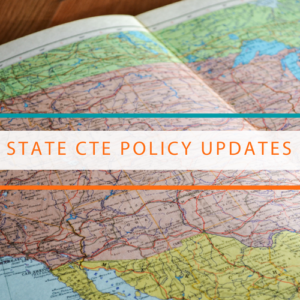In this blog, Policy Associate Velie Sando highlights policies enacted by Washington state in 2024 that facilitate access to Career Technical Education (CTE) for learners within special populations as identified by the Carl D. Perkins Career and Technical Education Act (Perkins V).
As outlined in Without Limits: A Shared Vision for the Future of Career and Technical Education (CTE Without Limits), CTE plays a central role in fostering an inclusive and equitable future for all learners, supporting them in their pursuit of high-demand, high-wage careers while meeting industry demands for talent. Variables such as program expenses, transportation issues, and eligibility criteria create access and equity hurdles encountered by special populations and other impacted learners when pursuing CTE programs. 
In recognizing the diverse challenges individuals may encounter in accessing CTE, states like Washington have taken proactive measures to break down barriers and promote inclusivity. In 2024, Washington enacted policies prioritizing equity and opportunity for special populations in their state.
Washington’s commitment to inclusivity is evident through H.B. 1889, which removes the citizenship status barrier for individuals seeking professional licenses or certifications. This bill ensures that all individuals, regardless of their legal status, have equal access to opportunities in the workforce as allowed under federal guidelines. By mandating that an individual’s status does not impede their ability to obtain a license, Washington fosters an environment where talent and skill are most valued in the workforce.
Given their historical background and landscape, Washington enacted HB 2019 which establishes the Native American Apprentice Assistance program to address the specific challenges faced by Native American communities. This bill acknowledges Native learners’ aspirations to pursue higher education and supports this endeavor by addressing prevalent systemic barriers that they face, such as poverty and limited access to postsecondary institutions near reservations. Washington aims to uplift Native American learners and empower them to thrive in CTE fields by prioritizing funding to cover tuition costs and adopting population-specific guidelines that may facilitate learner success in the program through consultations with Indigenous nations and apprenticeship programs.
Washington’s commitment to inclusivity extends beyond removing immigration barriers and recognizing cultural assets to encompass educational prerequisites. By adopting HB 2216, the state revolutionizes its hiring efforts by removing barriers to employment qualifications for certain state positions to exclude a four-year college degree requirement. This bill opens doors for individuals who may have previously been excluded from state employment by recognizing that diverse avenues of skill acquisition exist, paving the way for a more inclusive workforce in Washington.
Fostering inclusivity in CTE is imperative to ensure all learners have access to and can succeed in high-quality CTE programs; inclusivity also positively impacts a state’s economy. By dismantling barriers and prioritizing equity, Washington is enriching its workforce and nurturing vibrant and resilient communities.
For more strategies to expand access to CTE for special populations, check out the “Maximizing Access & Success for Special Populations” briefs prepared by Advance CTE and ACTE for supporting special populations and other learners groups in need of additional support.
- Foster Youth
- Non-traditional Learners
- Out-of-Workforce Individuals
- Economically Disadvantaged Learners
- English Learners
- Individuals with Disabilities
- Learners Experiencing Homelessness
- Military Connected Learners
- Single Parents
- Migrant and Undocumented Learners

- LGBTQ+ Learners
- Justice-Involved Learners
- Tribal Learners
Velie Sando, policy associate


 As the new year unfolds, 38 governors across the nation have delivered their much-anticipated
As the new year unfolds, 38 governors across the nation have delivered their much-anticipated  For further insights and resources connected to workforce development, check out our Learning that Works Resource Center.
For further insights and resources connected to workforce development, check out our Learning that Works Resource Center.
 In October 2023, New Hampshire passed
In October 2023, New Hampshire passed  In March 2023, Virginia enacted
In March 2023, Virginia enacted  On Tuesday, February 7, President Joe Biden delivered the annual State of the Union address to a joint session of Congress. The speech focused on the President and Congress’ accomplishments over the last two years, including significant investments in advanced
On Tuesday, February 7, President Joe Biden delivered the annual State of the Union address to a joint session of Congress. The speech focused on the President and Congress’ accomplishments over the last two years, including significant investments in advanced